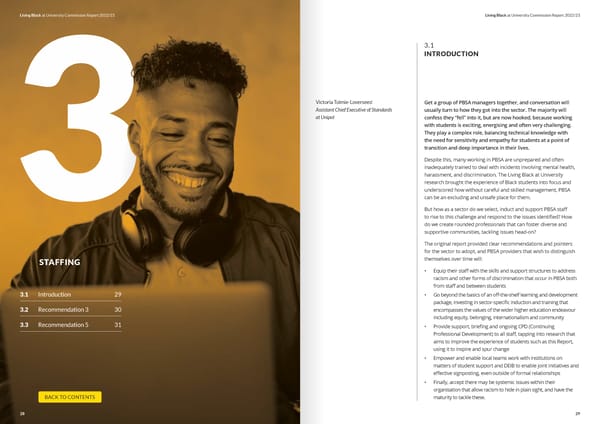Living Black at University Commission Report 2022/23 Living Black at University Commission Report 2022/23 3.1 INTRODUCTION Victoria Tolmie-Loverseed Get a group of PBSA managers together, and conversation will Assistant Chief Executive of Standards usually turn to how they got into the sector. The majority will at Unipol confess they “fell” into it, but are now hooked, because working with students is exciting, energising and often very challenging. They play a complex role, balancing technical knowledge with the need for sensitivity and empathy for students at a point of transition and deep importance in their lives. Despite this, many working in PBSA are unprepared and often inadequately trained to deal with incidents involving mental health, harassment, and discrimination. The Living Black at University research brought the experience of Black students into focus and underscored how without careful and skilled management, PBSA can be an excluding and unsafe place for them. But how as a sector do we select, induct and support PBSA sta昀昀 to rise to this challenge and respond to the issues identi昀椀ed? How do we create rounded professionals that can foster diverse and supportive communities, tackling issues head-on? The original report provided clear recommendations and pointers for the sector to adopt, and PBSA providers that wish to distinguish STAFFING themselves over time will: • Equip their sta昀昀 with the skills and support structures to address racism and other forms of discrimination that occur in PBSA both from sta昀昀 and between students 3.1 Introduction 29 • Go beyond the basics of an o昀昀-the-shelf learning and development package, investing in sector-speci昀椀c induction and training that 3.2 Recommendation 3 30 encompasses the values of the wider higher education endeavour including equity, belonging, internationalism and community 3.3 Recommendation 5 31 • Provide support, brie昀椀ng and ongoing CPD (Continuing Professional Development) to all sta昀昀, tapping into research that aims to improve the experience of students such as this Report, using it to inspire and spur change • Empower and enable local teams work with institutions on matters of student support and DEIB to enable joint initiatives and e昀昀ective signposting, even outside of formal relationships • Finally, accept there may be systemic issues within their organisation that allow racism to hide in plain sight, and have the BACK TO CONTENTS maturity to tackle these. 2828 29
 Living Black at University Commission Report web Page 14 Page 16
Living Black at University Commission Report web Page 14 Page 16